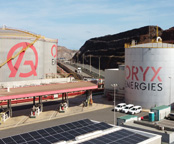Actualités
 27 octobre 2025
Oryx Energies Bénin célèbre 25 ans d'engagement
27 octobre 2025
Oryx Energies Bénin célèbre 25 ans d'engagement
 6 juin 2025
Addax Energy renouvelle avec succès sa facilité de crédit renouvelable
6 juin 2025
Addax Energy renouvelle avec succès sa facilité de crédit renouvelable
 31 janvier 2025
2024 : engagements et faits marquants
31 janvier 2025
2024 : engagements et faits marquants
 17 décembre 2024
Ouganda: Unveiling of EVERMAX™, an advanced additive-enriched fuel
17 décembre 2024
Ouganda: Unveiling of EVERMAX™, an advanced additive-enriched fuel
 20 novembre 2024
Oryx Energies Uganda s'associe à Yongeza Capital pour l'e-mobilité
20 novembre 2024
Oryx Energies Uganda s'associe à Yongeza Capital pour l'e-mobilité
 17 septembre 2024
Oryx Energies étend son réseau de stations-service en Ouganda
17 septembre 2024
Oryx Energies étend son réseau de stations-service en Ouganda
 12 septembre 2024
Oryx Energies augmente sa position majoritaire en Afrique du Sud
12 septembre 2024
Oryx Energies augmente sa position majoritaire en Afrique du Sud
 9 août 2024
Réponse aux allégations sur l'accord entre Addax Energy et la SONAP
9 août 2024
Réponse aux allégations sur l'accord entre Addax Energy et la SONAP
 5 juillet 2024
Addax Energy clôture avec succès sa 1e facilité de crédit renouvelable
5 juillet 2024
Addax Energy clôture avec succès sa 1e facilité de crédit renouvelable
 4 juillet 2024
Côte d'Ivoire : inauguration d'un nouveau centre emplisseur GPL
4 juillet 2024
Côte d'Ivoire : inauguration d'un nouveau centre emplisseur GPL
Résultats 1-10 sur 73 Suivant Dernière page

